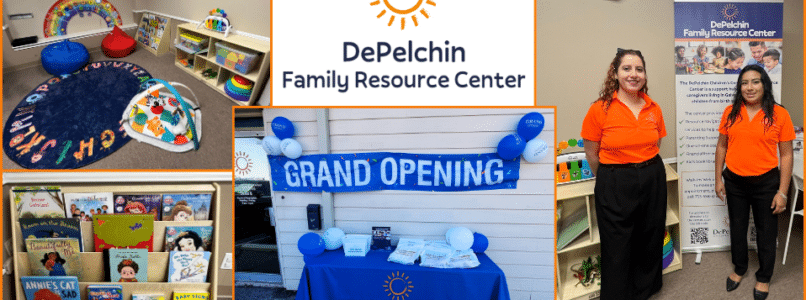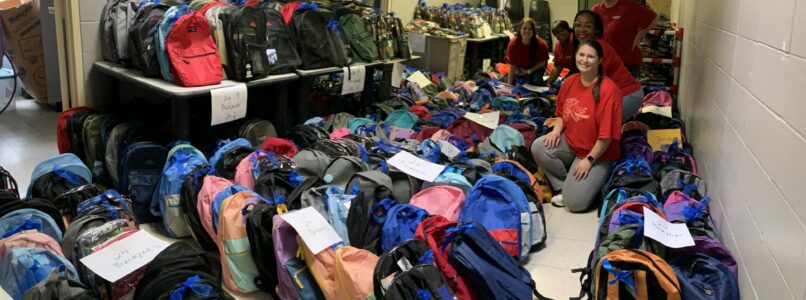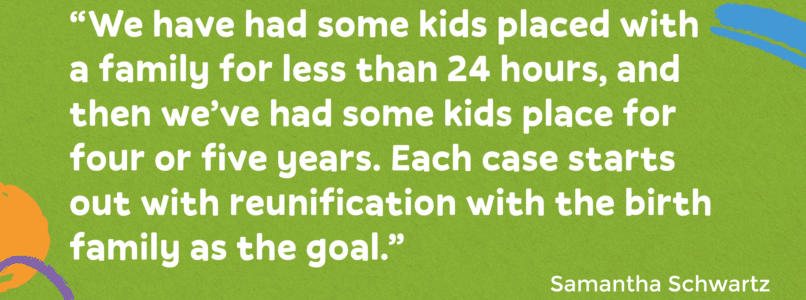May is National Foster Care Month, and we are celebrating all of the families who provide temporary care for children through DePelchin. Our families come in all shapes and sizes and play a critically important role in the lives of children who have suffered from abuse or neglect.
DePelchin is always looking for more families to provide foster care, but families who are interested in caring for children may not know where to begin. Below, Samantha Schwartz, DePelchin’s Director of Foster Care Services, answers some common questions about the process of bringing a child into the home through foster care.
We hope this information will be helpful to anyone who is considering becoming a foster parent or looking to learn more about the needs of these children.
How does a child come to be in a foster home?
A phone call is made to a state hotline when someone suspects abuse or neglect. Depending on the severity of the allegation, they will send that family to get services first, because they want to try to help that child at home. We don’t always see those children right off the bat. If they can’t be kept at home, they typically explore kinship care — family or a close friend of the family to care for the child — before going straight to foster care.
At that point, if someone to provide kinship care cannot be found, they are officially removed, and that is when we and other child-placing agencies will get a call saying, “Hey, we have a 4-year-old boy, here are some of his needs, do you happen to have any homes that can care for his needs?” Then we look at our pool of families who are licensed and that may fit that child’s needs, and then we’ll call the family and give them the backstory of this child. We will go from there on placement and case manage them through permanency, whatever that is. Permanency could be to place the child back with the biological parents, it could be kinship, or it could be adoption.
So as a foster family, you may get a call and you are soon caring for that child for an indefinite amount of time?
Yes. Typically, if we are doing an emergency placement, we hope our families give us an answer within 30 minutes of getting that initial call. But then the placement typically happens within two to three hours after that initial phone call. We have had some kids placed with a family for less than 24 hours, and then we’ve had some kids place for four or five years. Each case starts out with reunification with the birth family as the initial goal for the child.
What are some misconceptions about foster care?
It is the type of families that can be licensed to provide foster care. A lot of people that think that there is just one type of family, a two-parent household. And that’s just not the case. We see families in different shapes and sizes, there is not just one type of family that fits.
Is cost a deterrent to providing foster care?
It definitely should not be. We help cover a lot of those costs. There are some out-of-pocket costs for a fire inspection and some things related to house safety that we ask families tocover. But there really isn’t a ton that we expect from foster parents throughout the licensing process. You don’t have to be rich to be a foster parent. We ask that you have a budget that has some wiggle room for allowing some kids to be placed in your home and supporting them while waiting on the reimbursement that the state provides.
Are there enough foster families for the children who need them?
There have always been families available for the younger children. And that one is always an easier placement to make. But we’re seeing more kids come in a little bit older, seven and older, and their needs are a little different. There is always a need for families that can take care of groups of siblings.
What kind of training do foster families get?
They attend an orientation at the beginning of our process to kind of learn the ins and outs of foster care. Then they start the application process. Once they are getting close to the end of the application process, they go through our training, and it is anywhere from trauma-informed care to cultural competency and that you understand what’s needed for the child placed in your home.
If you are not in a position to serve as a foster parent, but you want to be supportive of foster families, what are some ways that you can help these children and families?
Respite care is a great way to help. There are different qualifications for short-term versus long-term, but it’s basically somebody that can help provide care for the child. It may be providing care for a few hours while the foster parents run to the grocery store, or so they can go to a movie on a Saturday night. If you are interested in maybe becoming a foster family, respite care is a great way to dip your toe in the water.
For more information about how to become a foster family through DePelchin, please visit our Prospective Parents page.











